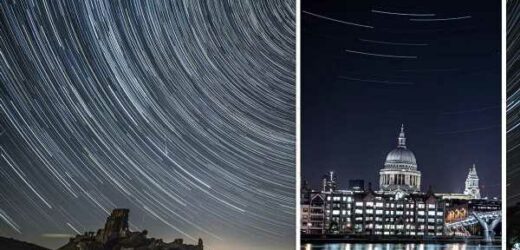Meteor spotted in night sky over Northern Ireland
We use your sign-up to provide content in ways you’ve consented to and to improve our understanding of you. This may include adverts from us and 3rd parties based on our understanding. You can unsubscribe at any time. More info
Meteor showers create rare opportunities to watch stunning celestial displays, with Britons getting their turn today. Astronomers have predicted the Eta Aquarids will pass through the atmosphere above the UK tonight. The meteors will grace UK skies for several hours, and experts have revealed the best time to watch the event.
What is the best time to see the Eta Aquarid meteor shower?
The Eta Aquarids are the product of Halley’s comet, a celestial object discovered in 1758 that passes the Earth once a lifetime on its 75-year orbit of the Sun.
The upcoming meteor shower comes from the comet’s long tail, which casts debris into the atmosphere.
As its peak falls between May 5 and 6, the Eta Aquarids can cause up to 50 meteors an hour.


There is no specific time when the most meteors will pass the UK, but astronomers have found the ideal hour to stargaze.
People hoping to watch the display will want to wait for “astronomical twilight”.
This time of day is when the sun’s centre has dipped between 12 and 18 degrees below the horizon.
Astronomical twilight provides the darkest skies and is best for budding astronomers hoping to see the Eta Aquarids.

In May, astronomical twilight falls between 2.47am and “civil twilight” roughly two hours later at 4.45am.
Provided the weather brings clear skies, people should have no trouble watching the meteors on the morning of May 6.
Watchers will want to bring a chair outside and sit back to watch the display for a couple of hours.
According to the Greenwich Royal Observatory, the meteors should be visible to the naked eye.

People may need to wait a while for their vision to adjust to the sky.
Those best placed to see the meteors are people living in areas with low light pollution.
UK cities like London often have too many artificial light sources that brighten the sky and make objects harder to see.
Sunrise will effectively end any chances of seeing the meteors a couple of hours after nautical twilight at 5.22am.
Which other meteor showers are happening in 2022?
Those who miss the Eta Aquarids on May 5 and 6 need fear not, as the meteors will continue to explode above the UK until May 28.
Beyond then, there is no shortage of other incoming meteor showers.
The remaining meteor showers for 2022 include:
Delta Aquariids: July 12 to August 23
Alpha Capricornids: July 3 to August 15
Perseids: July 17 to August 24
Draconids: October 6 to 0
Orionids: October 2 to November 7
Taurids: October 10 to December 10 (depending on the hemisphere)
Leonids: November 6 to 30
Geminids: December 4 to 20
Ursids: December 17 to 26
Source: Read Full Article


